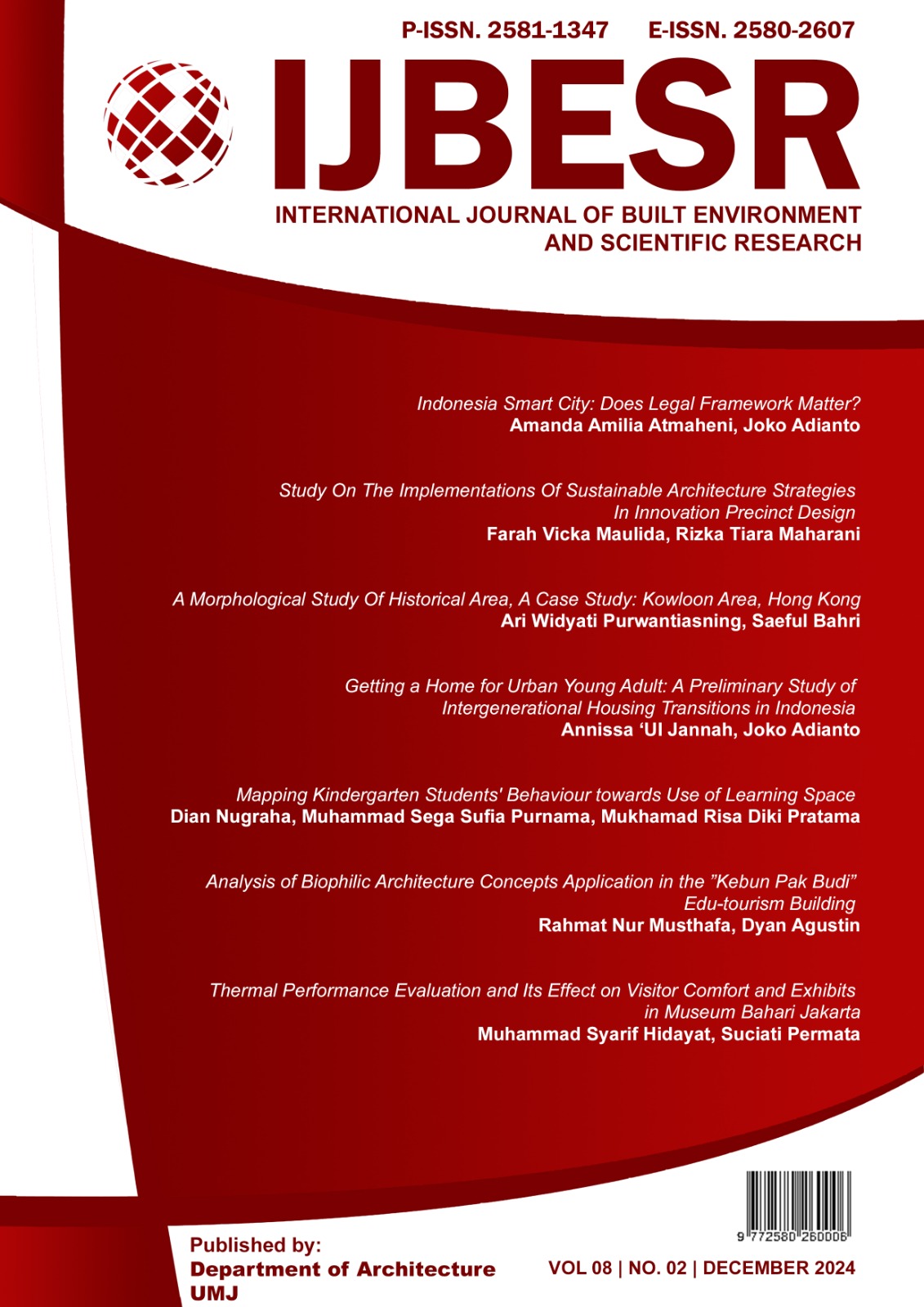Indonesia’s Smart City: Does Legal Framework Matter?
DOI:
https://doi.org/10.24853/ijbesr.8.2.93-104Keywords:
Smart City, legal framework, IndonesiaAbstract
This article delves into the pressing challenges encountered in the advancement of smart city initiatives in Indonesia, particularly emphasizing the critical necessity for comprehensive standard guidelines. Despite nationwide excitement surrounding smart city development, a lack of a unified regulatory framework has led to inconsistent urban planning strategies, devoid of a unified direction. The article's main goal is to emphasize the importance of establishing laws governing smart city development in Indonesia. Additionally, it aims to showcase innovative efforts undertaken by various groups to address this regulatory gap and promote inclusive smart city development. This study examines the challenges hindering Smart City development in Indonesia. By examining relevant academic literature and legal documents, the study analyzes the challenges stemming from the fragmented legal landscape. The analysis highlights how this lack of national coherence hinders national coherence, disrupts project implementation, and impedes program evaluation.. Overall, the article advocates for prioritizing a national legal framework that will foster a more stable environment, benefiting researchers, policymakers, and ultimately, the citizens who stand to gain from successful Smart City initiatives.References
L. Boediono, “Perlu Reformasi Berani untuk Wujudkan Potensi Perkotaan Indonesia.” Accessed: Dec. 20, 2021. [Online]. Available: https://www.worldbank.org/in/news/press-release/2019/10/03/indonesia-bold-reforms-needed-to-realize-urban-potential
P. Tutuko, N. Bonifacius, D. Yuniawan, A. Safrilia, M. R. Junianto, and R. J. Aleksander Telnoni, “Tracing the City Pattern of Netherlands and Indonesia using Depth Calculation and Connectivity,” J Phys Conf Ser, vol. 1167, p. 012012, Feb. 2019, doi: 10.1088/1742-6596/1167/1/012012.
S. Wilonoyudho, “Urbanization and Regional Imbalances in Indonesia,” Indonesian Journal of Geography, vol. 49, no. 2, p. 125, Dec. 2017, doi: 10.22146/ijg.13039.
R. Miranti, A. Duncan, and R. Cassells, “Revisiting the Impact of Consumption Growth and Inequality on Poverty in Indonesia during Decentralisation,” Bull Indones Econ Stud, vol. 50, no. 3, pp. 461–482, Sep. 2014, doi: 10.1080/00074918.2014.980377.
Pemerintah Republik Indonesia, Instruksi Presiden Republik Indonesia Nomor 3 Tahun 2003 Tentang Kebijakan dan Strategi Nasional Pengembangan E-Government.
Pemerintah Republik Indonesia, Undang Undang Nomor 23 Tahun 2014 tentang Pemerintahan Daerah. Indonesia, 2014.
Pemerintah Republik Indonesia, Peraturan Presiden Republik Indonesia No 2 Tahun 2015 tentang Rencana Pembangunan Jangka Menengah Nasional Tahun 2015 - 2019. Indonesia, 2015.
C. Harrison, Roads to Smarter Cities, vol. 9781118478. 2014. doi: 10.1002/9781118753972.ch4.
Anggraini, “Perjalanan Profesor Suhono, Guru Besar ITB yang Jadi Sosok di Balik Smart City di Indonesia.” Accessed: Dec. 20, 2021. [Online]. Available: https://www.bernas.id/81239-perjalanan-profesor-suhono-guru-besar-itb-yang-jadi-sosok-dibalik-smart-city-di-indonesia
A. B. Pratama, “‘Smart is not Equal to Technology’: An Interview With Suhono Harso Supangkat on the Emergence and Development of Smart Cities in Indonesia,” Austrian Journal of South-East Asian Studies, vol. 15, no. 1, pp. 125–132, 2022, doi: 10.14764/10.ASEAS-0055.
S. H. Supangkat, “Layanan TIK dan Pembangunan Smart City Indonesia Smart City Initiatives.” Bogor, Nov. 2016.
Direktorat Jenderal Penataan Ruang Kementerian Pekerjaan Umum, “KAJIAN PENGEMBANGAN SMART CITY Dl INDONESIA,” Jakarta, 2015.
R. Rosandya, “Langkah Menuju ‘100 Smart City.’” Accessed: Dec. 20, 2021. [Online]. Available: https://www.neraca.co.id/article/93533/langkah-menuju-100-smart-city
Pemerintah Republik Indonesia, Peraturan Presiden Republik Indonesia Nomor 59 Tahun 2017 Tentang Pelaksanaan Pencapaian Tujuan Pembangunan Berkelanjutan. Indonesia, 2017.
Kementerian Komunikasi dan Informasi Republik Indonesia, Peraturan Menteri Komunikasi Dan Informasi Nomor 13 Tahun 2016 tentang Hasil Pemetaan Urusan Pemerintahan Daerah di Bidang Komunikasi dan Informatika. Indonesia, 2016.
Kementerian Komunikasi dan Informasi Republik Indonesia, Peraturan Menteri Komunikasi dan Informatika Nomor 14 Tahun 2016 Tentang Pedoman Nomenklatur Perangkat Daerah Bidang Komunikasi dan Informatika. Indonesia, 2016.
Pemerintah Republik Indonesia, Peraturan Presiden Republik Indonesia Nomor 39 Tahun 2019 Tentang Satu Data Indonesia. Indonesia, 2019.
Kementerian Komunikasi dan Informatika Republik Indonesia, Peraturan Menteri Komunikasi Dan Informatika No 8 Tahun 2019 tentang Penyelenggaraan Urusan Pemerintahan Konkuren Bidang Komunikasi dan Informatika. Indonesia, 2019.
Direktorat Jenderal Aplikasi Informatika, Panduan Penyusunan Masterplan Smart City. Jakarta: Kementerian Komunikasi dan Informatika, 2017.
Pemerintah Republik Indonesia, Undang Undang Nomor 12 Tahun 2011 Tentang Pembentukan Peraturan Perundang-Undangan. Indonesia: https://peraturan.bpk.go.id/Details/39188/uu-no-12-tahun-2011, 2011.
Pemerintah Republik Indonesia, Peraturan Pemerintah Republik Indonesia Nomor 59 Tahun 2022 Tentang Perkotaan. Indonesia, 2022.
Johan, E. D. Madyatmadja, and M. F. Habibie, “Types of smart city services: A systematic literature review,” ICIC Express Letters, Part B: Applications, vol. 12, no. 8, pp. 765–772, Aug. 2021, doi: 10.24507/icicelb.12.08.765.
D. Oktaria, Suhardi, and N. B. Kurniawan, “Smart city services A systematic literature review,” International Conference on Information Technology Systems and Innovation (ICITSI), Oct. 2017, doi: https://doi.org/10.1109/ICITSI.2017.8267944.
A. Herdiyanti, P. S. Hapsari, and T. D. Susanto, “Modelling the smart governance performance to support smart city program in Indonesia,” in Procedia Computer Science, Elsevier B.V., 2019, pp. 367–377. doi: 10.1016/j.procs.2019.11.135.
M. Boban and M. Weber, “Internet of Things legal and regulatory framework in digital transformation from smart to intelligent cities,” in MIPRO, May 2018, pp. 1359–1364. doi: https://doi.org/10.23919/MIPRO.2018.8400245.







